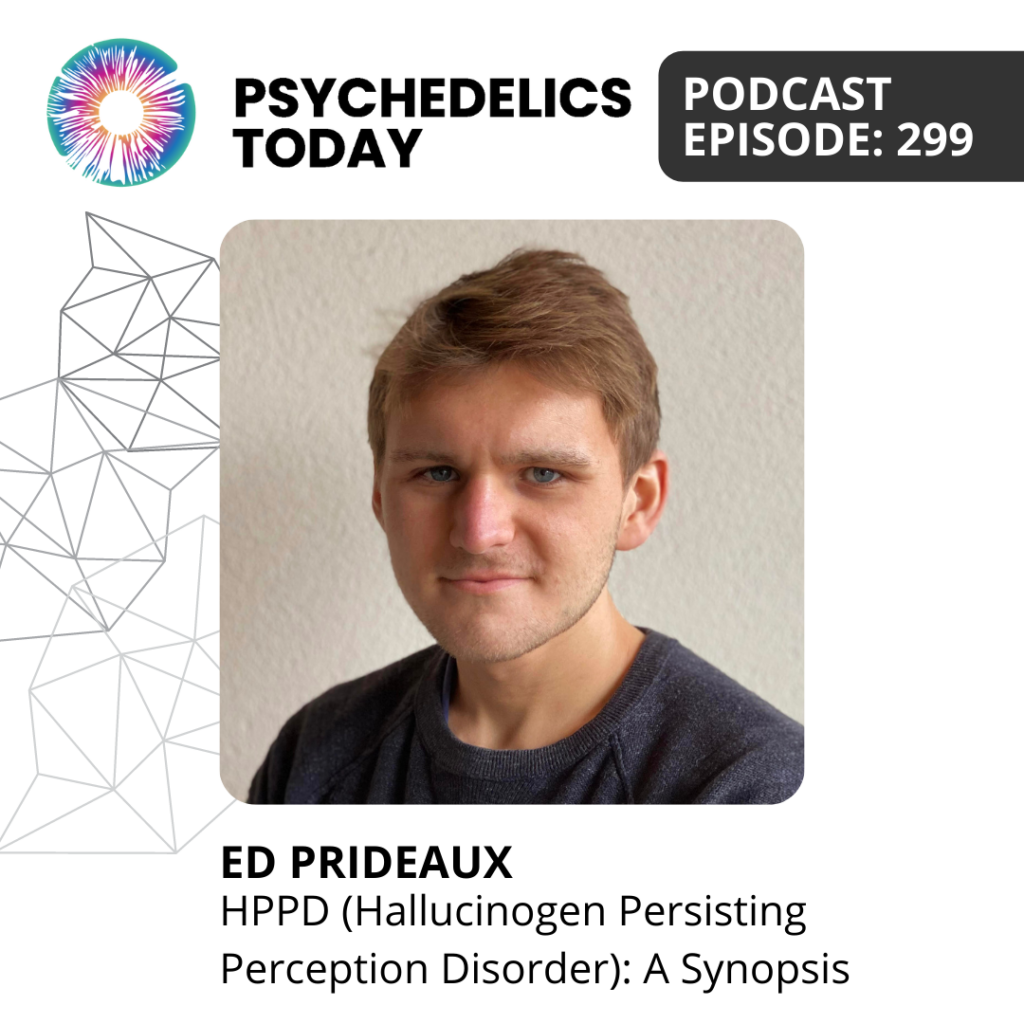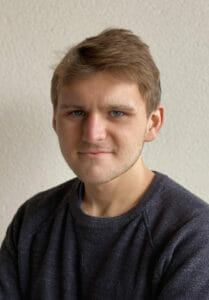
Health
PT299 – Ed Prideaux – HPPD (Hallucinogen Persisting Perception Disorder): A Synopsis
March 8, 2022
In this episode of the podcast, Joe interviews Ed Prideaux: UK-based writer and journalist working to raise awareness around Hallucinogen Persisting Perception Disorder (HPPD) in affiliation with the Perception Restoration Foundation.

In this episode of the podcast, Joe interviews Ed Prideaux: UK-based writer and journalist working to raise awareness around Hallucinogen Persisting Perception Disorder (HPPD) in affiliation with the Perception Restoration Foundation.
While HPPD is known in the psychedelic community (Kyle has unfortunately had experience with it), it’s not talked about or researched enough, and often considered by many as fake or a trauma reactivation. Prideaux likes to call HPPD “post-drug perceptual changes,” and talks all about it: how it came about in his life and how it affects him; what visual snow syndrome and other common HPPD visuals look like; big names in the field and current research; neurodiversity and looking at things from a “critical psychiatry” lens; how he thinks HPPD relates to anxiety and distress from depersonalization effects and isolation (did you know that visual changes are reported in people with generalized anxiety disorders?); and how so much of the lack of knowledge and progress around HPPD is a direct result of the drug war.
Is there a higher chance of HPPD happening when the experience happens in youth? Are there dormancy effects? Is cannabis a larger trigger than people think? Is the biggest trigger being overwhelmed by a larger-than-expected dose? Is LSD the most commonly reported culprit due to how long the trip is? Is one unintentionally training their brain to get used to a trip during these long experiences? Could entering into more non-ordinary states of consciousness actually be the solution?
The Perception Restoration Foundation is working on a study in Macquarie University in Australia looking at neuroimaging of people with HPPD, they just released an HPPD information guide in collaboration with MAPS, and they are working to finalize and release a documentary called “HPPD: Stuck in an Altered World” that features someone at least Joe and this show notes writer are huge fans of: Andrew Callaghan of Channel 5 News (previously of “All Gas No Breaks”). We will have a companion piece about HPPD from Prideaux in the blog this week as well.
Notable Quotes
“I remember lots of experiences where I’d be in my living room with my parents (who had no idea what I was going through) and I’d look at my Dad, I’d look away, and a complete afterimage of his silhouette would linger in the air for several seconds. Walls would morph, I’d see faint geometric patterns on the floor and on surfaces at school; surfaces, walls, carpets – they would melt and move waxly, like I was in a kind of semi-psychedelic state. There’d be times when I’d glance over at the carpet and there would be faint mandalas and kaleidoscopes on it. …The worst effect of these visual changes; it wasn’t so much anxiety about what I’d done, it was just the sheer sense of isolation, as if I was stuck in my own essentially mini broken perceptual world that I was just too freaked out to tell any of my friends or family about.”
“I don’t want to be a savior guy here, but these severe HPPD cases have, for the longest time, been essentially left voiceless. And I hope that this film will be the voice and mouthpiece for them.”
“I think part of the HPPD problem is our culture’s entire warped relationship with drugs, in particular, in creating the conditions for the sense of isolation and self-shame that can come with HPPD. …With drugs, it seems to be that there’s limited room for empathy. It’s just like, ‘Yeah, you’re a druggie and this is what you did to yourself. You fried your brain.’ The brain-frying thing; it’s a huge source of self-stigma for people with HPPD. I definitely experienced it myself in the first year after I developed the condition, like, ‘Yeah, I’m a basket case. I’m an acid casualty.’ And I think that all of these really needlessly self-shaming, incredibly negative and unpleasant narratives people tell themselves are allowed to fester in a culture where we can’t have open conversations about the risks and benefits of drugs.”
“In the current environment we’re in with the psychedelic renaissance, we’re in a delicate pivotal time for psychedelics. And obviously, this is psychologizing for other people and projection is playing a role here, but I think people can feel self-conscious about coming out and saying, ‘Hey, yeah, I have actually been having some difficulty from my trips,’ because they don’t want to spoil the fun. They don’t want to derail the train.”
Links
Edprideaux.journoportfolio.com
YouTube: “HPPD: Stuck In A Distorted World” trailer
Psychreg.org: Changing Your Brain State Through the Ganzfeld Effect
HPPDonline.com: Perception Foundation’s HPPD study at Macquarie University
Madnessradio.net (Will Hall’s podcast)
The Myth of Mental Illness: Foundations of a Theory of Personal Conduct, by Thomas S. Szasz, M.D.
Psychedelicreview.com: Psychedelics and Perception Part 1: Visual Effects
About Ed Prideaux
 Ed Prideaux is a UK-based writer and journalist who’s written about psychedelics for the BBC, VICE, The Independent, and Unherd, and other topics for The Guardian, The Financial Times, The Spectator, and The Quietus. Ed is working to advocate and raise awareness around Hallucinogen Persisting Perception Disorder (HPPD) in affiliation with the Perception Restoration Foundation, a new 501 (c) (3) nonprofit that has secured the launch of HPPD’s first breakout studies in decades.
Ed Prideaux is a UK-based writer and journalist who’s written about psychedelics for the BBC, VICE, The Independent, and Unherd, and other topics for The Guardian, The Financial Times, The Spectator, and The Quietus. Ed is working to advocate and raise awareness around Hallucinogen Persisting Perception Disorder (HPPD) in affiliation with the Perception Restoration Foundation, a new 501 (c) (3) nonprofit that has secured the launch of HPPD’s first breakout studies in decades.
.
Support the show!
- Patreon
- Leave us a review on Facebook or iTunes
- Share us with your friends
- Join our Facebook group – Psychedelics Today group – Find the others and create community.



